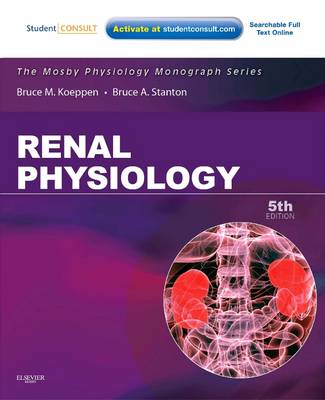(To see other currencies, click on price)
MORE ABOUT THIS BOOK
Main description:
Renal Physiology helps you to quickly and easily grasp the fundamentals of renal physiology and learn how to apply them in a clinical context. Thoroughly updated, this medical textbook in the Mosby Physiology Monograph Series provides a basic understanding of normal kidney function at the cellular and molecular level. Attractively illustrated with clear 2-color diagrams, it also facilitates study with learning objectives, "In the Clinic" and "At the Molecular Level" boxes, chapter summaries, and clinical cases with review questions and explained answers. Online access at www.StudentConsult.com makes this an even more accessible powerful learning resource.
Contents:
Introduction to the Kidney
1 Physiology of Body Fluids
Objectives
Physicochemical Properties of Electrolyte Solutions
Molarity and Equivalence
Osmosis and Osmotic Pressure
Osmolarity and Osmolality
Tonicity
Oncotic Pressure
Specific Gravity
Volumes of Body Fluid Compartments
Composition of Body Fluid Compartments
Fluid Exchange Between Body Fluid Compartments
Capillary Fluid Exchange
Cellular Fluid Exchange
Summary
Key Words and Concepts
Self-Study Problems
2 Structure and Function of the Kidneys
Objectives
Structure of the Kidneys
Gross Anatomy
Ultrastructure of the Nephron
Ultrastructure of the Glomerulus
Ultrastructure of the Juxtaglomerular Apparatus
Innervation of the Kidneys
Summary
Key Words and Concepts
Self-Study Problems
3 Glomerular Filtration and Renal Blood Flow
Objectives
Renal Clearance
Glomerular Filtration Rate
Glomerular Filtration
Determinants of Ultrafiltrate Composition
Dynamics of Ultrafiltration
Renal Blood Flow
Regulation of Renal Blood Flow and Glomerular Filtration Rate
Sympathetic Nerves
Angiotensin II
Prostaglandins
Nitric Oxide
Endothelin
Bradykinin
Adenosine
Natriuretic Peptides
ATP
Glucocorticoids
Histamine
Dopamine
Summary
Key Words and Concepts
Self-Study Problems
4 Renal Transport Mechanisms: NaCl and Water Reabsorption Along the Nephron
Objectives
General Principles of Membrane Transport
General Principles of Transepithelial Solute and Water Transport
NaCl, Solute, and Water Reabsorption Along the Nephron
Proximal Tubule
Henle's Loop
Distal Tubule and Collecting Duct
Regulation of NaCl and Water Reabsorption
Summary
Key Words and Concepts
Self-Study Problems
5 Regulation of Body Fluid Osmolality: Regulation of Water Balance
Objectives
Antidiuretic Hormone
Osmotic Control of AVP Secretion
Hemodynamic Control of AVP Secretion
AVP Actions on the Kidneys
Thirst
Renal Mechanisms for Dilution and Concentration of the Urine
The Role of Urea
Vasa Recta Function
Assessment of Renal Diluting and Concentrating Ability
Summary
Key Words and Concepts
Self-Study Problems
6 Regulation of Extracellular Fluid Volume and NaCl Balance
Objectives
Concept of Effective Circulating Volume
Volume-Sensing Systems
Volume Sensors in the Low-Pressure Cardiopulmonary Circuit
Volume Sensors in the High-Pressure Arterial Circuit
Hepatic Sensors
Central Nervous System Na+ Sensors
Volume Sensor Signals
Renal Sympathetic Nerves
Renin-Angiotensin-Aldosterone System
Natriuretic Peptides
AVP
Control of Renal NaCl Excretion During Euvolemia
Mechanisms for Maintaining Constant Na+ Delivery to the Distal Tubule
Regulation of Distal Tubule and Collecting Duct Na+ Reabsorption
Control of Na+ Excretion with Volume Expansion
Control of Na+ Excretion with Volume Contraction
Edema
Alterations in Starling Forces
The Role of the Kidneys
Summary
Key Words and Concepts
Self-Study Problems
7 Regulation of Potassium Balance
Objectives
Overview of K+ Homeostasis
Regulation of Plasma [K+]
Epinephrine
Insulin
Aldosterone
Alterations of Plasma [K+]
Acid-Base Balance
Plasma Osmolality
Cell Lysis
Exercise
K+ Excretion by the Kidneys
Cellular Mechanisms of K+ Transport by Principal Cells and Intercalated Cells in the Distal Tubule and Collecting Duct
Regulation of K+ Secretion by the Distal Tubule and Collecting Duct
Plasma [K+]
Aldosterone
Arginine vasopressin (AVP)
Factors that Perturb K+ Excretion
Flow of Tubular Fluid
Acid-Base Balance
Glucocorticoids
Summary
Key Words and Concepts
Self-Study Problems
8 Regulation of Acid-Base Balance
Objectives
The HCO3- Buffer System
Overview of Acid-Base Balance
Renal Net Acid Excretion
HCO3- Reabsorption Along the Nephron
Regulation of H+ Secretion
Formation of New HCO3-
Response to Acid-Base Disorders
Extracellular and Intracellular Buffers
Respiratory Compensation
Renal Compensation
Simple Acid-Base Disorders
Metabolic Acidosis
Metabolic Alkalosis
Respiratory Acidosis
Respiratory Alkalosis
Analysis of Acid-Base Disorders
Summary
Key Words and Concepts
Self-Study Problems
9 Regulation of Calcium and Phosphate Homeostasis
Objectives
Calcium
Overview of Ca++ Homeostasis
Ca++ Transport along the Nephron
Regulation of Urinary Ca++ Excretion
Calcium-Sensing Receptor
Phosphate
Overview of Pi Homeostasis
Pi Transport along the Nephron
Regulation of Urinary Pi Excretion
Integrative Review of Parathyroid Hormone, Calcitriol, and Calcitonin on Ca++ and Pi Homeostasis
Summary
Key Words and Concepts
Self-Study Problems
10 Physiology of Diuretic Action
Objectives
General Principles of Diuretic Action
Sites of Action of Diuretics
Response of Other Nephron Segments
Adequate Delivery of Diuretics to Their Site of Action
Volume of the Extracellular Fluid
Diuretic Braking Phenomenon
Mechanisms of Action of Diuretics
Osmotic Diuretics
Carbonic Anhydrase Inhibitors
Loop Diuretics
Thiazide Diuretics
K+-Sparing Diuretics
Aquaretics
Effect of Diuretics on the Excretion of Water and Other Solutes
Solute-Free Water
K+ Excretion
HCO3- Excretion
Ca++ and Pi Excretion
Summary
Key Words and Concepts
Self-Study Problems
Additional Reading
APPENDIX A Integrative Case Studies
APPENDIX B Normal Laboratory Values
APPENDIX C Nephron Function
APPENDIX D Answers to Self-Study Problems
APPENDIX E Answers to Integrative Case Studies
APPENDIX F Review Examination
PRODUCT DETAILS
Publisher: Elsevier (Mosby)
Publication date: November, 2012
Pages: 256
Weight: 652g
Availability: Not available (reason unspecified)
Subcategories: Nephrology, Physiology
From the same series












